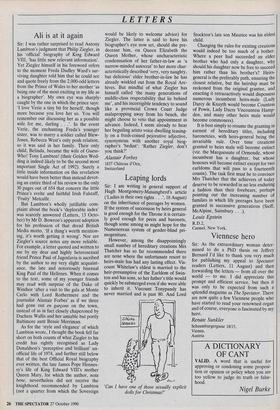Leaping lords
Sir: I am writing in general support of Hugh Montgomery-Massingberd's article (`Ladies in their own rights . . .', 18 August) on the inheritance of peerages by women. If the system of succession by heirs general is good enough for the Throne it is certain- ly good enough for peers and baronets, though some among us might hope for the Numenorean system of gender-blind pri- mogeniture.
However, among the disappointingly small number of hereditary creations Mrs Thatcher has so far recommended there are none where the unfortunate resort to heirs-male has had any lasting effect. Vis- count Whitelaw's eldest is married to the heir-presumptive of the Earldom of Swin- ton and has sons, so her father's title would quickly be submerged even if she were able to inherit it. Viscount Tonypandy has never married and is past 80. And Lord `Can I have one of those sexually explicit dolls for Christmas?' Stockton's late son Maurice was his eldest child.
Changing the rules for existing creations would indeed be too much of a bother. Where a peer had succeeded an elder brother who had only a daughter, why should his daughter now be free to succeed him rather than his brother's? Heirs- general is the preferably path, ensuring the closest relative, but the heirship must be reckoned from the original grantee, and enacting it retraoactively would dispossess numerous incumbent heirs-male (Lady Darcy de Knayth would become Countess of Powis, Lady Dacre Viscountess Hamp- den, and many other heirs male would become commoners).
It is best simply to resume the granting in earnest of hereditary titles, including baronetcies, with heirs-general being the invariable rule. Over time creations granted to heirs male will become extinct (viz. the Marquessate of Ormonde, whose incumbent has a daughter, but whose honours will become extinct except for two earldoms that will pass to a fourteenth cousin). The task first must be to convince Mrs Thatcher that the achievers of today deserve to be rewarded in no less enduring a fashion than their forebears, perhaps pointing out the increasing number of families in which life peerages have been granted in successive generations (Sieff, McAlpine, Sainsbury . . .).
Louis Epstein
R.D.2, Carmel, New York.


































































 Previous page
Previous page